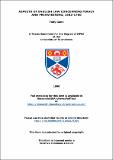Files in this item
Aspects of English law concerning piracy and privateering, 1603-1760
Item metadata
| dc.contributor.advisor | Martin, Colin | |
| dc.contributor.advisor | Smout, T. C. (T. Christopher) | |
| dc.contributor.author | Gane, Toby | |
| dc.coverage.spatial | 38 | en_US |
| dc.date.accessioned | 2015-03-18T16:51:20Z | |
| dc.date.available | 2015-03-18T16:51:20Z | |
| dc.date.issued | 1990 | |
| dc.identifier.uri | https://hdl.handle.net/10023/6260 | |
| dc.description.abstract | Piracy and privateering are certainly much written about subjects, and there is indeed extensive literature concerning many aspects and facets of the complicated history of the subjects. A glance at the Gosse Collection on piracy at the National Maritime Museum or a search through the archives of the British Library will illustrate this point admirably. It was apparent however, that one aspect of piracy and privateering had not so much been overlooked, but had never really been treated as a separate subject, was the law. Surprisingly even Charles Wye Kendall of the Middle Temple and Barrister-at-Law, in his work 'Private Men-of-War' had only covered this aspect in passing, homogenised into the whole text of his book. There is no doubt that both piracy and privateering have had differing effects on trade and commerce in seventeenth and eighteenth century Europe and Anglo-America, and hence had a wide social context and significance. As a result historians have taken the subjects, especially privateering, seriously although it has often been overshadowed by the historian’s preference for writing about the Navies of Europe. As a result of this social significance it was only a matter of course that a myriad of laws and statutes sprung up to control, inhibit, deter and prevent, around these controversial ways of life. The changing political situations and alliances in Europe affected the fluctuating tides of piracy and privateering in home waters and in the colonies. This essay looks at how the state sought to control piracy and privateering through legal recourse and the effects that the law had on the practices during the seventeenth century and first half of the eighteenth century. | en_US |
| dc.language.iso | en | en_US |
| dc.publisher | University of St Andrews | en |
| dc.rights | Creative Commons Attribution-NonCommercial-NoDerivatives 4.0 International | |
| dc.rights.uri | http://creativecommons.org/licenses/by-nc-nd/4.0/ | |
| dc.subject | Piracy | en_US |
| dc.subject | Privateering | en_US |
| dc.subject | Law | en_US |
| dc.title | Aspects of English law concerning piracy and privateering, 1603-1760 | en_US |
| dc.type | Thesis | en_US |
| dc.type.qualificationlevel | Doctoral | en_US |
| dc.type.qualificationname | MPhil Master of Philosophy | en_US |
| dc.publisher.institution | The University of St Andrews | en_US |
This item appears in the following Collection(s)
Except where otherwise noted within the work, this item's licence for re-use is described as Creative Commons Attribution-NonCommercial-NoDerivatives 4.0 International
Items in the St Andrews Research Repository are protected by copyright, with all rights reserved, unless otherwise indicated.


